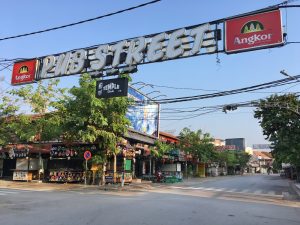Nearly half of tourism-related businesses in Cambodia have been forced to close their doors due to the compounding impacts of the COVID-19 pandemic, according to a new survey report published by the Asia Foundation last week.
Based on surveys conducted with around 1,000 tourism-related small and medium enterprises in various parts of the country in April 2021, the report found that 47 percent of tourism-related enterprises had ceased their operations since the beginning of the pandemic. Just 22 percent of businesses said that their operations were unchanged from before the arrival of COVID-19.
The businesses included both officially registered business – such as hotels, restaurants, travel agents, and karaoke bars – and the host of informal enterprises clustered around Cambodia’s tourism economy, which include street vendors and tuk-tuk drivers.
When asked for the reasons for not working as usual, 82 percent of those surveyed said it was due to a lack of customers. Another 10 percent cited safety concerns. “Compared to 2020… the negative effect of the pandemic on registered SMEs has been much more severe,” stated the report.
Compared to the last surveys in November 2020, 51 percent of businesses reported that “sales-revenue have completely stopped,” with another 48 percent saying that they had decreased. Just 1 percent reported an increase in revenue. Of the businesses surveyed, 77 percent said they were at “high risk” of not surviving the pandemic.
The finding illustrates the difficulties faced by those Southeast Asian nations that successfully contained COVID-19 for most of 2020, only to witness runaway outbreaks in the first half of 2021. Cambodia’s success in COVID-19 containment was exemplary. From February to November 2020, Cambodia recorded just 323 cases of the virus, and no deaths. But the virus began to spread in late February of this year, with total cases jumping from about 500 on February 20 to about 13,000 by the end of April, necessitating strict lockdowns that have compounded the impact on businesses already hit hard by the sharp drop-off in international visitors
Prior to the pandemic, tourism was one of the main drivers of the Cambodian economy, with the number of international tourist arrivals growing by an annual average of 12 percent over the past decade. According to the Asia Foundation report, this has created 16,221 registered tourism establishments and generated approximately 630,000 tourism-related jobs. In 2019, the sector contributed to approximately 18.7 percent of the country’s real GDP growth.
But the explosion of the COVID-19 pandemic has sent the sector into free fall. In 2020, the number of international tourist arrivals dropped by 80 percent, compared to 2019, while the number of domestic tourists fell by 36.1 percent.
The surveys show that while many tourism businesses managed to survive 2020 – 56 percent said they were operating as normal as of November of last year – the surge of COVID-19 cases since February has pushed many beyond the breaking point. The number of closures represented a sharp rise from the earlier rounds of surveys conducted by the Asia Foundation in July and November of 2020, which found that just 12 percent and 13 percent, respectively, of businesses had closed their doors due to COVID-19.
This finding, just one of many contained in the report, provides a granular illustration of the impacts of the pandemic on one particular sector in one particular country. It also suggests what might be termed the COVID-19 trap: a situation in which nations are caught between the dire public health impacts of outbreaks and the economic impacts of the lockdowns and restrictions needed to contain them. In the COVID-19 trap, success in one domain is often purchased at the cost of failure in the other.
The only route out of the cycle of outbreaks and lockdowns is to get populations vaccinated – as quickly as possible, and in this sense at least, Cambodia is leading nearly all of its neighbors, having given at least one dose of vaccine to more than 60 percent of its population. Even then, the impacts on some sectors – including tourism – could take many years to recover.

































